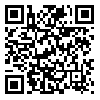BibTeX | RIS | EndNote | Medlars | ProCite | Reference Manager | RefWorks
Send citation to:
URL: http://ijpcp.iums.ac.ir/article-1-50-en.html
Introduction: The attitude towards medical recommendations can lead both to recovery or debility of patients and can therefore affect medical outcome. The present study was carried out with the aim of determining the relation between personality type and the amount of adherence to re-commended therapeutic regimens in patients with type II diabetes referred to
Method: Two hundred and fifty diabetic patients taking hypoglycemic agents with or without insulin were recruited using Nonprobability Sampling Method. A demographic questionnaire and information obtained from the interview were used to assess NEO-FFI Questionnaire, Degree of Adherence Questionnaire and the Diabetic Activity Questionnaire. The data were analyzed through one way analysis of variance, correlation coefficient and general linear model.
Results: Neuroticism showed a negative but statistically non-significant correlation with patients’ adherence to therapeutic regimens. Also, extraversion and conscientiousness showed a positive and significant correlation with adherence. After excluding the effect of some qualitative and quantitative alternatives using the general linear model test, it was shown that extraversion and social support have the highest effect.
Conclusion: Personality characteristics can affect the adherence of patients. Adherence is decreas- ed or increased with the decrease or increase in extraversion. Also, extraversion and social support have the highest effect on adherence.
Received: 2007/02/18 | Published: 2006/02/15
| Rights and permissions | |
 |
This work is licensed under a Creative Commons Attribution-NonCommercial 4.0 International License. |



